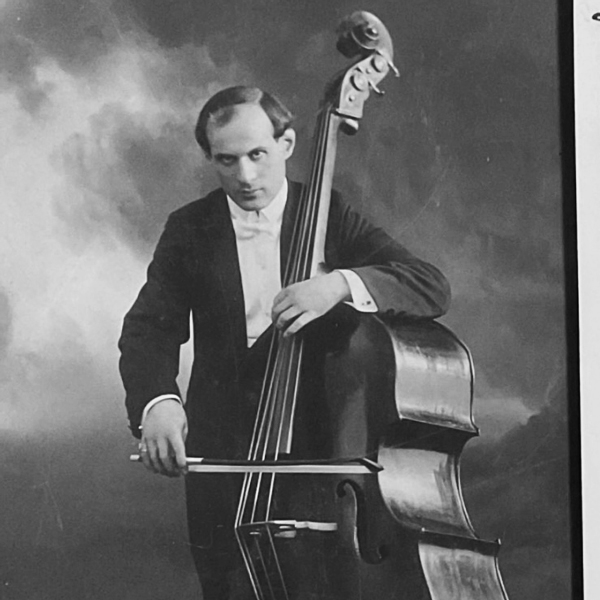
Guido Gallignani
(Lugo, 1880-1974)
Guido Gallignani (1880-1974), born in Lugo, Emilia-Romagna, was a double bass player, soloist, composer, and lecturer at the Universidad Nacional Autonoma of Mexico City (1937-45). He studied in Naples with Gaetano Negri, and in Bologna with Ugo Marchetti, both direct heirs of the renowned School of Giovanni Bottesini (1821-1885). After graduating in Bologna in 1903, Gallignani began his career in the same year as a solo player and orchestra member in Sweden. In 1908, he left the orchestras of the Royal Theater of Stockholm and Copenhagen, as well as the Musikkonservatorium of Malmö, to focus on being a soloist in Italy and abroad. This project was considered very challenging and unique due to the limited repertoire and the double bass’s humongous proportions and phonic gravity, which made it undesirable in an auditorium setting.
Despite all expectations, Gallignani’s concerts, regardless of the size of the audience or country, ended in so many rounds of applause that nobody wished to leave the theatre. His repertoire was predominantly comprised of his own compositions and works by Bottesini, Franchi, Koussevitzky, Bach, Pratella, Beethoven, Antonelli, and Gounod. The sound of his instrument felt so light and articulated that critics suggested changing the old story of Phaedrus from ”the frog wants to become an ox” to ”the elephant becomes a squirrel”. Gallignani used to play a rare Guadagnini (1740), his ”melhor amigo” (best friend), and he was defined as the Bottesini of the 1900s everywhere around the world by international critics and fellow eminent performers, such as César Thomson, Pablo Casals, Serge Koussevitzky and Lajos Montag.
-
Gallignani – “Faust” Fantasia: Alessandro Serra — PDF Sheet Music
Regular price From £8.99 GBPRegular priceUnit price / per£0.00 GBPSale price From £8.99 GBP -
Gallignani – Pulcinella: Alessandro Serra — PDF Sheet Music
Regular price From £8.99 GBPRegular priceUnit price / per£0.00 GBPSale price From £8.99 GBP -
Gallignani – Incogitatus Valse: Alessandro Serra — PDF Sheet Music
Regular price From £8.99 GBPRegular priceUnit price / per£0.00 GBPSale price From £8.99 GBP -
Gallignani — “Faust” Fantasia (arr. String Orchestra): Michele Cellaro — PDF Sheet Music
Regular price £22.99 GBPRegular priceUnit price / per£0.00 GBPSale price £22.99 GBP



